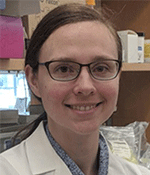At the 36th Annual Meeting of the Hudson Hoagland Society held virtually on May 20, members and guests heard from two UMass Chan Medical School researchers with unique and compelling research findings about COVID-19.
Jeremy Luban, MD, the David J. Freelander Professor in AIDS Research and professor of molecular medicine, spoke about what makes a SARS COV-2 variant a variant of concern. Beth A. McCormick, PhD, the Worcester Foundation for Biomedical Research Chair and professor of microbiology & physiological systems, spoke about genomic surveillance of COVID-19.
The Hudson Hoagland Society, named for the co-founder of the Worcester Foundation for Biomedical Research, is predicated on the understanding that biomedical research leads scientists and society in unexpected directions, and that support for pioneering research is a necessity.
Thoru Pederson, PhD, the Vitold Arnett Professor of Cell Biology, professor of biochemistry & molecular pharmacology, and scientific director of the Worcester Foundation for Biomedical Research when it merged with UMass Chan Medical School in 1997, announced the 2021 recipients of Worcester Foundation Research Grants, which are supported by gifts to the Hudson Hoagland Society.
The grant recipients are:

Prabhani Atukorale, PhD
Systemic multi-targeted immuno-nanoparticle therapy for ‘unmasking’ metastatic dormancy

Patricia Cho, MD
Microbiome and apolipoproteins in urinary tract infections and renal damage

Tianxiao Huan, PhD
A pilot proteomic study to identify new therapeutic targets of age-related macular degeneration

Sumeda Nandadasa, PhD
Development of a novel model of the ciliopathies Meckel syndrome, nephronophthisis and Joubert Syndrome

Jillian Richmond, PhD
Evaluating treatment responsiveness and disease activity in multiple sclerosis patients using high-resolution technologies to examine blood and cerebrospinal fluid